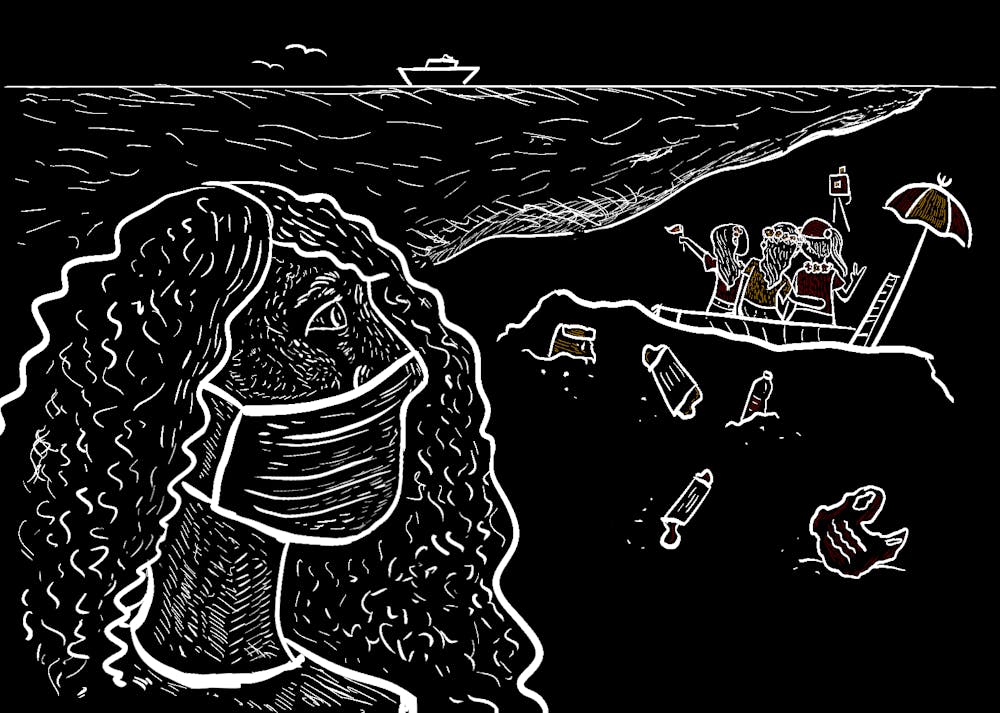Barrett, The Honors College is planning to take seniors on a trip to Hawaii in March. This trip is to celebrate the students' college experience coming to an end. However, this voyage will be at the expense of the health and wellbeing of the Hawaiian people and environment of Hawaii as well as the trip failing to address the colonial history in the island.
Those who opposed the trip began to unite with a petition. The main arguments against it are because the COVID-19 pandemic is still ongoing and due to the pandemic, Hawaiians have asked tourists to forego visiting for recreation.
Despite this, most tourists who visit Hawaii are going for vacation, not for necessary reasons. These high numbers show that the only thing more widespread than COVID-19 is ignorance and selfishness.
According to Nicole Greason, director of marketing and public relations for Barrett, "The itinerary for this trip includes visits to historically, culturally and ecologically significant sites and activities including Iolani Palace, Pearl Harbor, Diamond Head and Hanauma Bay and a traditional Hawaiian luau. In addition, students will participate in a community service project giving back to the local community."
The college is also planning on holding meetings to learn about the history and culture of Hawaii to assuage the demands of opponents of the trip. However, these niceties are not enough.
"Obviously, the people in charge don't care about any of the issues I brought up, and the petition was only enough to convince them to add a community service activity. In my view, this is below the bare minimum," said Elise Crawford-Paz Soldan, a senior in Barrett studying conservation biology and ecology and art studies.
Crawford-Paz Soldan started the petition, which has gotten over 300 signatures, against the trip to Hawaii.
Although COVID-19 numbers were at their worst in Hawaii last summer, the islands saw another surge in cases just last month due to the omicron variant. Despite this, Barrett continued to plan its trip. Even though COVID-19 only further complicates the current situation in Hawaii, it's not the only reason why tourists should stay away.
The petition highlights the history of colonization in Hawaii. According to Smithsonian Magazine, Hawaii was first settled by Polynesians in A.D. 400, but white Europeans did not discover the island until 1778. Settlers took control of Hawaii, overthrew the kingdom and annexed the islands as an American territory against the will of the native people.
Like many Indigenous American groups, Native Hawaiians were decimated by disease. After contact with white settlers, the Native Hawaiian population dropped from 300,000 to 70,000. Colonization massacred almost two-thirds of the Native Hawaiian population.
They say history repeats itself, which may be why people are, once again, bringing disease to Hawaii even after being asked not to come.
Even without disease as a factor, tourism still has a negative impact on the environment and economy of Hawaii, creating an unhealthy co-dependence of the economy on tourists.
To quote an article from Cultural Survival, "In Hawai'i, the destruction of our land and the prostitution of our culture is planned and executed by multi-national corporations, by huge landowners, and by collaborationist state and county governments.”
Tourists are beginning to outnumber Hawaiian residents. This has caused the cost of living to skyrocket, driving Native Hawaiians closer to poverty and forcing them to leave their homeland in search of better conditions.
Because of this, Native Hawaiians have begun to protest. Many of them want to overthrow the American government in Hawaii. Not only are they being driven out of their homes, but most of the new construction taking place on the island is bulldozing over sacred land, stripping Hawaiians of their culture for profit.
This shows colonization is not just a historical term, but an ongoing process that ignores the voices of those who truly care about the land.
"I think it's just wildly irresponsible. And it's kind of disrespectful of a lot of wishes that have come from Hawaiians themselves, asking people not to come,” said Logan Franklin, a senior studying conservation biology and ecology.
At this point, Barrett has a decision on whether or not they want to cancel the trip. Although this would be a disappointment to some students, it would be the most selfless action.
However, this seems unlikely, as the trip is set to move forward.
What may be a fun spring break weekend for a group of privileged college students will be at the detriment of the long-term wellbeing of the citizens of Hawaii.
Reach the columnist at htenore@asu.edu and follow @haleyyhmt on Twitter.
Editor's note: The opinions presented in this column are the author's and do not imply any endorsement from The State Press or its editors.
Want to join the conversation? Send an email to opiniondesk.statepress@gmail.com. Keep letters under 500 words and be sure to include your university affiliation. Anonymity will not be granted.
Like The State Press on Facebook and follow @statepress on Twitter.

Haley Tenore is the editor of the State Press Opinion Desk. Tenore is also a digital reporter for Cronkite News and a co-president of the Accessibility Coalition. This is her fourth semester on the opinion desk and second semester as editor.




